25 Oct PD’s Immigration Unit

At Adelanto from left DPDs Robert Hill and Albert Camacho, and Immigration Fellow Serge Lakobrija, DPDs Rosario Corona and Albert Ruvalcaba, and Paralegal Jessica Lopez.
At the end of a very long eggshell-colored hallway smelling of disinfectant and processed food, beyond a battleship gray door, several men young and old stood staring out of glass windows.
These men were detainees in holding cells at the Adelanto Immigration and Customs Enforcement (ICE) Processing Center’s intake area, where they awaited interviews, medical evaluations, security level classification, and clothing.
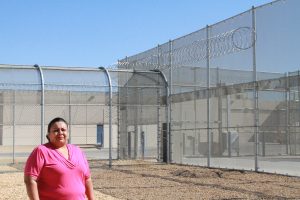
Paralegal Jessica Lopez prepares to tour Adelanto.
Several attorneys and a paralegal from the Los Angeles County Public Defender’s Immigration Unit were there taking a tour of the San Bernardino County facility. With a 1,940-detainee capacity, it is California’s largest immigration detention center. During the tour, they peppered tour guide and ICE Field Office Director Gabriel Valdez with questions.
What’s the average stay? The answer: 74 days. Are psychologists and psychiatrists on staff? Yes. Do guards carry oleoresin capsicum spray? Yes, and the supervisors carry jumbo canisters even though incidents requiring their deployment are rare.
Visiting Adelanto was important to the Unit, whose members fight each day to prevent clients from ending up there as a result of new criminal convictions.
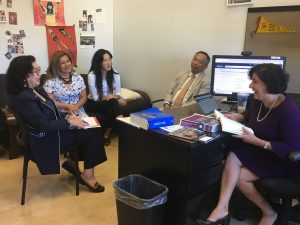
From left DPD Elsa Leyva, LOSA Sandra Mercado, DPD Kathy Park, Deputy-in-Charge Rudy Navarro and Head Deputy Graciela Martinez at an Immigration Unit meeting.
“It allowed us to see the environment that our former clients are currently living in as they await their immigration proceedings,” Deputy Public Defender Albert Camacho said. During the tour, Valdez was open to the team’s request to provide detainees contact information to reach the Unit.
Getting the facility to post the Immigration Unit’s contact information to all inmates “made the entire trip incredibly valuable,” Camacho said. “We will soon have our contact information posted within the facility, which all inmates with Los Angeles County convictions can take advantage of, allowing them to reach us and get assistance with their immigration issues.”
This trip to Adelanto is one way the Immigration Unit excels in their mission to protect the legal rights of vulnerable noncitizen residents from draconian immigration policies. Seventeen years ago, Head Deputy Graciela Martinez began focusing on the unique needs of immigrant clients.
About four years ago, Deputy Public Defender Albert Camacho and Paralegal Jessica Lopez joined the effort. More recently, the team was expanded to now comprise 13 Unit members including Deputy-in-Charge Rudy Navarro. The members of the unit collectively speak English, Spanish, Korean, French and Serbian.
Branching Out
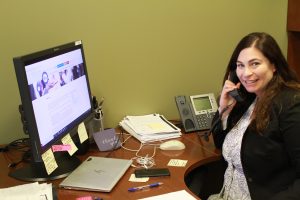
DPD Allison Klein is assigned to the Long Beach branch.
The Unit is headquartered at the Hall of Records, but one of the goals is to spread out Unit members to many of the Office’s 32 locations. To that end, Deputy Public Defender Robert Hill is assigned to the Clara Shortridge Foltz Criminal Justice Center in downtown LA, Glendy Ortiz is assigned to El Monte and Allison Klein is assigned to Long Beach. Each attorney assigned to a general area becomes the immigration point person for that area, handling all questions from the attorneys and general public. They also conduct trainings, hold office hours and appear on various post-conviction matters within that geographic area.
“We are the pilot projects,” Klein said. “Here in Long Beach a lot of people come up to the window and ask about expungements or other type of post-conviction relief. So when the paralegals come across anyone who has immigration concerns, I’m here and they consult with me.”
Some criminal convictions can lead to deportation or other dire immigration consequences so consulting with the Immigration Unit is imperative for noncitizens seeking assistance with record clearing.
Physically being at a branch also allows Klein to consult with deputy public defenders with cases involving noncitizens, and to appear in court on behalf of immigrant clients seeking post-conviction relief.
“I’m here to strategize with our lawyers,” she said. “Our job is also to educate prosecutors and judges. Yesterday, a judge said a certain charge was not an issue with immigration, so I set up a meeting with the judge.”
Unit members are experts in crimmigration — the intersection of criminal law and immigration law. The Unit helps both colleagues and individual clients mitigate the immigration consequences of a criminal prosecution.
Given the Trump administration’s attack on the immigrant community, there has never been a more urgent need for the LA County Public Defender’s Office to be at the forefront of protecting the legal rights of noncitizens beyond the bare minimum duty established by Padilla, Martinez said.
Padilla Advisements
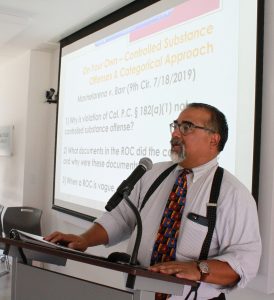
DPD Albert Camacho holds a crimmigration training session in the community.
Since 1987, California case law has recognized that criminal lawyers have an affirmative duty to not misadvise their noncitizen clients regarding the immigration consequences of criminal convictions.
In 2010, the United States Supreme Court in the case of Padilla v. Kentucky (2010) 559 U.S. 356 held that under the Sixth Amendment, defense counsel now had the affirmative duty to advise on “readily knowable immigration consequences” of a criminal conviction.
When colleagues contact the Unit to inquire about the potential immigration consequences of their client’s criminal conviction, those contacts are referred to as “Padilla advisements.” A large part of the Unit’s daily efforts go toward providing Padilla advisements on pending cases.
“The Immigration Unit strives not to meet only the minimum duty mandated by the law but provide a thorough analysis of all likely consequences so that clients can make the most educated decision possible,” Martinez said.
“This means going beyond advice limited to deportability and inadmissibility and including an analysis of eligibility for relief from removal, such as waivers, or possible post-conviction relief options, as well consideration of securing a disposition that will protect our clients from being turned over to ICE, under the provisions of the California Trust Act.”
Each attorney is mandated by the US Supreme Court and California precedents as well as by California statute to provide a Padilla advisement to every noncitizen client. Failure to do so constitutes ineffective assistance of counsel.
Noncitizens who pled to a crime that triggered adverse immigration consequences and did not meaningfully understand these immigration penalties or were not adequately advised by counsel may now be eligible to have their conviction vacated and thereby avoid deportation. This relief is available to individuals even if they are no longer in actual or constructive custody based on legislation enacted in 2017 and codified under Penal Code section 1473.7.
Immigration lawyers seeking this type of relief for their clients are hiring criminal defense lawyers to file and litigate these post-conviction motions. These motions can involve recent pleas, or pleas that were entered over 30 years ago.
In any case where post-conviction relief is being sought by a former client, the Immigration Unit has a protocol in place to reach out to post-conviction counsel on behalf of the office. Unit members act as liaisons between immigration counsel and the post-conviction attorney representing the noncitizen client in criminal court.
The goal of the Unit is to facilitate an immigration-safe resolution in these post-conviction matters, obviating the need for a contested hearing.
“The Immigration Unit steps in to work with immigration counsel and the post-conviction criminal attorney. We work very hard to come to a just conclusion.” Lopez said.
Referrals for Immigration Assistance
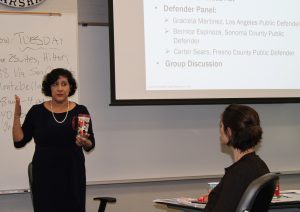
Head Deputy Graciela Martinez gives a presentation in the community.
It is not only Deputy Public Defenders that contact the Unit for assistance. Members of the general public also contact the Unit, usually seeking assistance with clearing their record either before applying for some form of immigration benefit or relief or for guidance on an immigration-related matter.
Often, the first point of contact for members of the public is Lopez. She fields numerous calls daily from people desperate for help. Sometimes, the person has been referred to her by Public Defender staff, in hopes that the Unit can assist. Lopez screens clients to see if there is anything our office can do on their behalf, and if so, will refer the matter to the appropriate person.
Additionally, the Unit refers individuals to our community immigration legal service partners; the Unit has become an integral part of the Los Angeles County immigrant advocacy community. An important subset of referrals made by the Unit are for non-detained, justice-involved youth who may qualify for Special Immigrant Juvenile Status (SIJS), which can provide a pathway to citizenship.
Writing Amicus Briefs and Other Advocacy
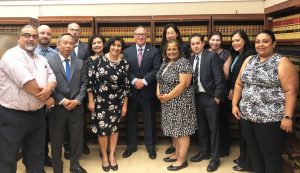
8.The Immigration Unit with Assistant Public Defender Ruben Marquez. From left: Albert Camacho, Serge Lakobrija, Rudy Navarro, Bobby Hill, Elsa Leyva, Graciela Martinez, Ruben Marquez, Kathy Park, Rosario Corona, Albert Ruvalcaba, Alison Klein, Glendy Ortiz and Jessica Lopez.
The Unit protects the immigrant community in many other ways, including 1) monitoring ICE detainer requests and the Los Angeles County Sheriff’s Department compliance with the California Values Act; 2) participating in local and state coalitions and networks pertinent to advocating on behalf of noncitizens; 3) representing the Public Defender at immigration-specific task forces and government meetings such as the Los Angeles County Executive Action Task Force.
The Unit works with the Office of Diversion and Reentry, Mental Health Courts, Homeless Courts and Other Collaborative Courts on noncitizen cases. The Unit is involved nationally and statewide in training criminal defense attorneys on the intersection of criminal and immigration law.
Keeping up with the everchanging political landscape, the Unit advocates for legislation that protects the rights of non-citizen clients and litigates immigration-related matters in state and federal courts.
“My overall goal is to create a model in LA County that allows us to not only comply with our Sixth Amendment duty to adequately advise clients, but beyond that to make sure that we secure services for our noncitizen clients,” Martinez said. “We’re creating protocols on how to use holistic advocacy for all of our clients including noncitizens.”

